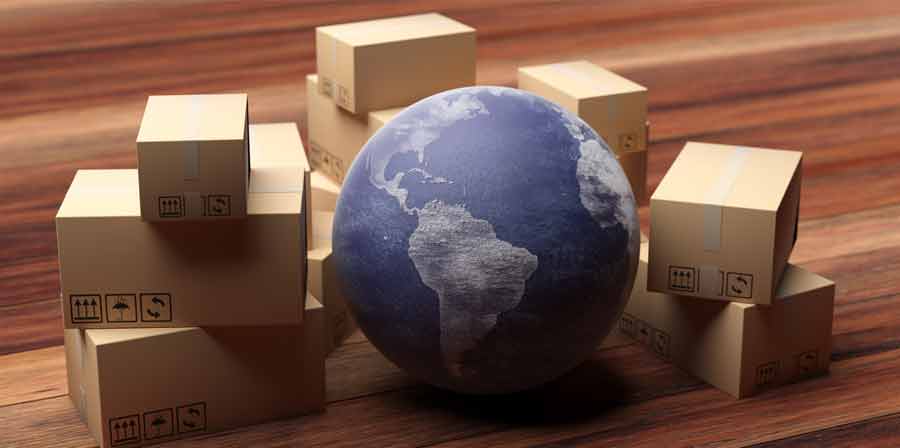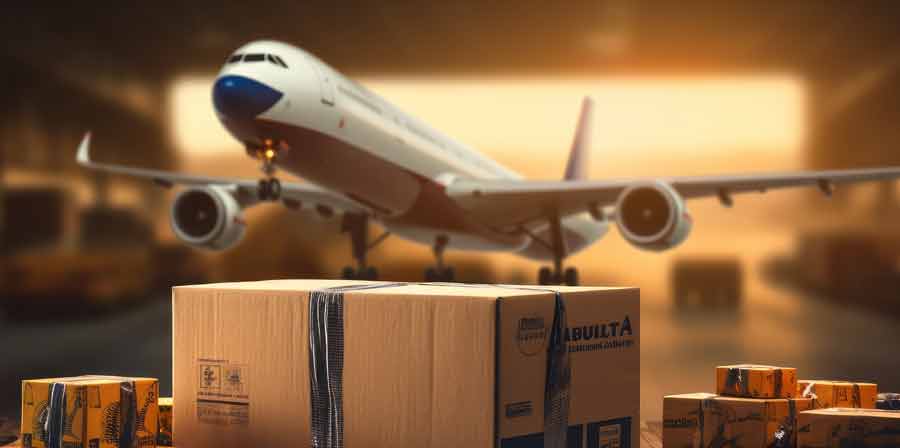The digital revolution has transformed the way businesses operate, making it easier than ever for eCommerce enterprises to sell their products and services to customers worldwide. This global reach presents enormous growth opportunities but also comes with its set of complexities, particularly in the realm of international customs regulations. Expanding your eCommerce business to international markets may initially appear challenging and intimidating. To help overcome those challenges, we put together a guide to understanding international custom regulations and growing your business with international sales.
Understanding the Global eCommerce Landscape
As the world becomes increasingly interconnected, the global eCommerce landscape continues to evolve, presenting businesses with unprecedented opportunities for expansion. In fact, the global eCommerce market was worth about $4.29 trillion in 2020 and continues to grow at an astonishing rate with a current value pegged at around $4 trillion for 2024 due namely to decreased consumer spending post-pandemic.
Of course, such strong market value also means that there are plenty of eager businesses shipping wares worldwide, which is why it’s crucial to understand how customs works for any entity that is considering expanding its global footprint. What's more, international customs regulations can vary widely from country to country, making it crucial for businesses to thoroughly understand these rules before venturing into a new market.
The Importance of Navigating International Customs Regulations
Complying with international customs regulations is not just a legal requirement—it's also a critical factor in ensuring smooth business operations and maintaining customer satisfaction. Here’s what you need to know:
- Preventing Legal Issues: Non-compliance with customs regulations can lead to legal issues, fines, and penalties, damaging a business's reputation and financial stability.
- Ensuring Smooth Delivery: Proper compliance ensures that goods move smoothly across borders, preventing delays that can disrupt supply chains and lead to dissatisfied customers.
- Avoiding Unexpected Costs: Understanding customs duties and taxes helps businesses accurately price their products and avoid unexpected costs that can eat into their profits.
By prioritizing compliance with international customs regulations, businesses can safeguard their reputation, finances, and customer satisfaction. Now, let's explore the key aspects and challenges of these regulations in more detail.
Key Aspects of International Customs Regulations
There are several important aspects of customs that all growing eCommerce businesses need to understand.
- Customs Laws: Each country has its own unique set of laws that pertain to and regulate the import and export of tangible goods. Understanding these laws is crucial to ensure legal compliance and smooth transportation of goods across borders.
- Tariffs and Duties: Tariffs and duties can significantly impact the cost of goods. Forward thinking businesses should plan ahead for these costs and factor them into their bottom line.
- Product Regulations and Standards: There are a variety of different standards and regulations that apply to a wide gamut of products that are imported or exported. Businesses must think ahead with compliance in mind, which tends to vary from port to port and country to country.
As we delve deeper into the complexities of international customs regulations, let's break down the key aspects that every growing eCommerce business should be aware of. From understanding unique customs laws to planning for tariffs and navigating diverse product regulations, these insights are essential for a successful global expansion strategy.
The Importance of Customs Regulations in E-commerce
Customs regulations are in place to ensure that goods are lawfully entering any region while safeguarding the interests of consumers and ensuring fair trade is in place. Here’s what you need to know:
- Customs Duties and Taxes: These are charges imposed by the customs authorities on imported goods. Different countries have different rates they impose for duties and taxes, which means mindful businesses must adjust their pricing to reflect this.
- Customs Declaration: All imported goods must be accompanied by a customs declaration form that is specific for the region they are being shipped to, or they may be held up, returned or seized.
- Customs Clearance: This is the process by which goods are approved for entry into a country after a payment is tendered for any associated fees, duties and taxes, alongside the proper documentation.
As we navigate the intricate world of customs regulations in e-commerce, it's crucial to grasp their fundamental role in ensuring legal and fair trade while safeguarding consumer interests. Keep in mind the critical aspects like customs duties and taxes, the importance of accurate customs declarations, and the seamless process of customs clearance, as we explore strategies for international compliance.
Key Challenges in Navigating International Customs Regulations
Navigating international customs regulations can present several challenges for businesses involved in e-commerce. Here are some key issues to consider:
Changing Regulations: Staying up to date on the constantly changing regulations -- which vary from region to region -- is critical for eCommerce entities seeking global expansion.
Varied Customs Duties and Taxes: The types of duties, taxes and fees can and does vary, which makes it essential for businesses to understand these and factor them into their cost and processes in advance.
- Documentation Requirements: Customs regulations are especially strict and mandate that any package that’s being imported be accompanied by the proper documentation to ensure clearance.
- Import and Export Restrictions: A multitude of countries have enacted certain, varying restrictions on what can and cannot be imported. It’s on the shoulders of the business that’s shipping these products to be cognizant of this.
As we tackle the key challenges posed by international customs regulations in e-commerce, it's crucial to recognize and address the common issues that businesses encounter. These challenges encompass staying updated on ever-changing regulations, managing the diversity of customs duties and taxes, meeting strict documentation requirements, and navigating import and export restrictions. Let's delve into efficient approaches to conquer these challenges and guarantee a smooth expansion into the global market.
Strategies for Navigating International Customs Regulations
Successfully navigating international customs regulations requires strategic planning and execution. Along the way, consider these following strategies for the best results.
- Conduct Ample Research: Carefully research the laws of the countries you are considering expanding to. This research should be conclusive and pertain directly to any import and export laws, existing taxes, duties, and tariffs; and any underlying restrictions on imports.
- Utilize Technology: Leverage technology to streamline and automate customs processes. For example, AI-based classification engines can quickly categorize products, facilitating accurate customs declarations.
- Seek Expert Advice: Hire the expertise of an expert to help you navigate the complexities of customs in a specific region to ensure the smooth flow of goods into your target expansion market.
- Build Relationships: Develop strong relationships with local partners and customs authorities. Maintaining these relationships can ensure an uninterrupted flow of your eCommerce goods into that region.
To succeed in the intricate world of international customs regulations, eCommerce businesses must adopt a strategic approach. This includes conducting comprehensive research on the laws, taxes, and duties of target countries, harnessing technology such as AI-based classification engines for efficient customs processes, seeking expert guidance for navigating regional complexities, and fostering strong relationships with local partners and customs authorities to facilitate the seamless flow of goods. As we explore these strategies further, you'll gain valuable insights into mastering global expansion while complying with customs regulations.

Preparing for International Customs Compliance
Before entering a new market, eCommerce businesses should take several steps to prepare for international customs compliance.
- Classification of Goods: Each product must be correctly classified according to the Harmonized System (HS) code, a universally accepted classification system for traded goods. The HS code determines the customs duties applicable to a product.
- Accurate Documentation: The best method to assure clearance through customs is by providing accurate, detailed documentation. This entails a range of documents, including commercial invoices, packing lists, and various shipping records, among other essential paperwork.
- Understanding Customs Valuation: Every nation has a different valuation process they use to assess the value of the inbound goods and any associated fees, duties, taxes or tariffs. Gaining insight into customs valuation techniques enables businesses to precisely declare their product values, mitigating the risk of disagreements with customs authorities.
- Conduct Compliance Audits: Schedule routine, self-administered compliance audits to ensure your process is seamless. This can include internal audits and regular training for staff involved in customs processes.
When preparing for international customs compliance, eCommerce enterprises should adopt a systematic and well-organized approach. This involves accurate product classification using the Harmonized System (HS) code, meticulous documentation, including commercial invoices and packing lists, understanding diverse customs valuation methods across nations to prevent disputes, and conducting regular compliance audits, which can encompass internal reviews and staff training. As we delve into these practices, you'll gain valuable insights into ensuring your global expansion is compliant and efficient.
Practical Customs Clearance Tips for E-commerce Businesses
To successfully navigate international customs regulations, e-commerce businesses can follow these practical tips:
- Stay in the Know: Study and understand the customers regulations of any target regions and keep up to date on any changing rules, regulations or laws.
- Accurate Documentation: Ensure that all necessary documents are accurately completed and provided with the shipment. This includes items like the declaration form, the invoice, and any other required documentation such as a permit or a specialty license.
- Use a Customs Broker: Consider employing the services of a customs broker—an expert specialized in guiding businesses through the intricacies of customs regulations. Their primary objective is to facilitate the uninterrupted delivery of international goods by simplifying the complex customs processes.
- Be Transparent with Customers: Let your customers know in advance about any added fees or shipping delays they may encounter on international orders to preserve satisfaction and improve loyalty and retention.
In the realm of international customs compliance, e-commerce businesses can enhance their efficiency and customer satisfaction by following practical customs clearance tips. This involves staying well-informed about target region regulations and staying updated on evolving laws, ensuring precise documentation, including declaration forms, invoices, permits, and specialty licenses, leveraging the expertise of customs brokers to navigate complexities, and prioritizing transparency with customers regarding potential added fees and shipping delays for international orders. As we explore these tips further, you'll gain valuable insights into optimizing your customs clearance processes and fostering strong customer relationships.
Leveraging Technology for Customs Compliance
Consider adding the right technological tools and logistical software to the mix that can help your entity better navigate international customers.
- Automation Tools: Automation tools are powerful streamliners that can assist with tools for product classification, customs documentation, and duty calculation.
- Data Analytics: Using analytical data, bottlenecks can be avoided, synergy can peak and issues can be resolved before they grow to become frequent and costlier.
- Integration with Business Systems: Integrating customs processes with other business systems, such as eCommerce platforms and ERP systems, can improve data accuracy and streamline workflows.
To optimize customs compliance, it's essential to incorporate the right technological tools and logistical software. These tools, including automation, data analytics, and integration with business systems, can help businesses navigate international customs efficiently, prevent bottlenecks, and enhance overall operational synergy. As we delve into the benefits of technology in customs compliance, you'll discover how these tools can revolutionize your international business processes.
Mastering International Customs Regulations for Successful Global eCommerce Expansion
Understanding and successfully navigating internal customs is complicated. Start by understanding the customs regulations of target markets, leveraging technology, and implementing robust compliance practices. By doing so, growing businesses can expand their global footprint and reach new segments of eager customers.
Here at Jillamy, we grasp the intricacies and hurdles associated with expanding your eCommerce presence internationally. Leveraging our proficiency in international logistics and our dedication to tailoring solutions, we provide comprehensive support, guiding businesses through each phase of their global expansion. Our services ensure efficient and compliant cross-border trade, turning logistical obstacles into opportunities for growth.
Contact us today at 800-592-7449 to speak with our experts on international customs regulations or reach out on our contact us page. We're here to help you navigate the complexities of international customs, ensuring a smooth and successful global expansion.


